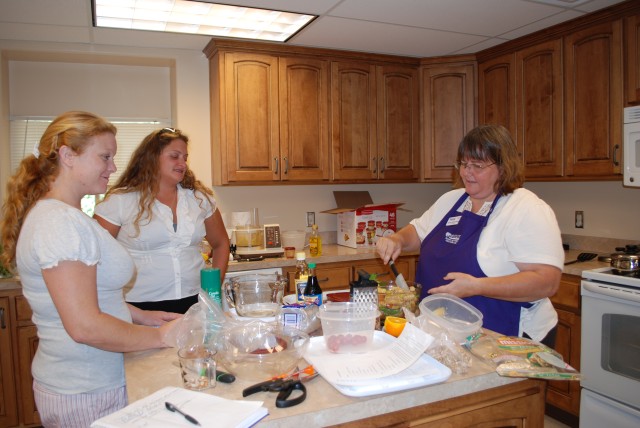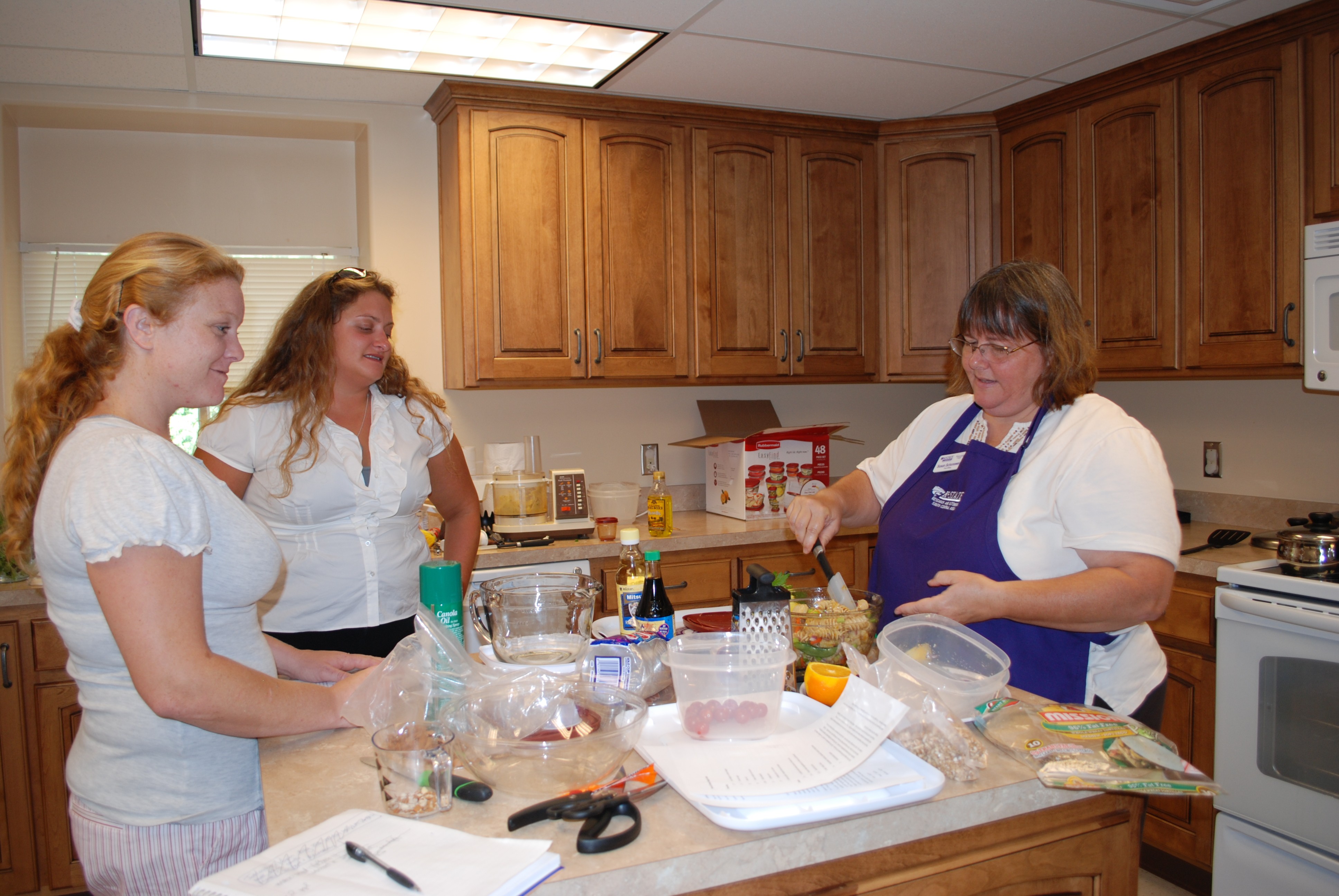
FORT RILEY, Kan. - The women who gathered in the Army Community Service Annex Aug. 20 came to learn to cook heart healthy meals. But they left with that knowledge and more including free samples, pamphlets of recipes and free tote bags.
Susan Schoneweis, registered dietician, nutrition and health extension agent for the Kansas State University Research and Extension office, led the Heart Healthy Cooking Class from 10 a.m. to noon. The small class sampled pasta and mixed veggie salad, basic hummus with whole wheat tortilla chips and grilled lemon ginger salmon.
Though the class was two hours, Schoneweis pointed out that the meals could be prepared much faster.
"We could whip all this out really quickly without distractions," she said.
In addition to these meals, Schoneweis added fruit and yogurt parfaits for dessert.
During the two-hour cooking class, Schoneweis demonstrated how to prepare meals, gave general cooking tips and explained which foods are better for your heart. She also encouraged attendees to pay attention to food labels and explained how to incorporate healthy foods into their diets.
"Our taste evolves. Keep trying new things. Eventually you might like them," she said.
She also suggested offering children healthier food choices because they might end up liking them.
"You'd be surprised by what kids will eat if you try to give them a variety of different foods," she said.
Before the class, the attendees were given a pre-test to measure their knowledge of heart healthy food choices. The test covered which vegetables had the highest sodium levels, what type of fat is considered the most heart healthy, how much low-fat food people should eat and what order ingredients are listed on a label.
Following the class, participants were given a post-test to measure what they had learned. For better heart health Schoneweis recommended people eat more antioxidants, which can be found in vegetables, fruits, whole grains and nuts.
She also urged participants to eat "a rainbow of colors every day" because experts think dark green, orange, red and purple fruits contain the most antioxidants.
Vitamins A, C, E and selenium are considered antioxidants. These nutrients are supposed to block free radials that can affect skin, organs and cells. Antioxidants are believed to block these radicals and, thus, prevent cell damage.
In addition to eating foods rich in antioxidants, Schoneweis recommended people limit their sodium intake. Limiting sodium can reduce high blood pressure and, in turn, reduce risk for heart disease and stroke. She stressed that salt is necessary for good health, but only in correct amounts.
"Salt is chemically important but we tend to get more than we need," she said.
According to a pamphlet distributed by Schoneweis' office, people should limit their sodium intake to 2400 mg. a day, or about one teaspoon of table salt. She recommended people avoid processed foods which have higher sodium levels.
"Sodium is added in each step of the process, so the less processed the food, the better," Schoneweis said.
Before the cooking class, Cybrina Kaneaster, an attendee whose husband is a contractor at Fort Riley, was already avoiding processed foods. Her children prefer homemade food to processed food and like to help in the kitchen.
Though she already knew to avoid processed food, Kaneaster came to the class because she "wanted to get a better idea of what's healthy for my family."
Erin Bishop, a family life agent for K-State Research and Extension, came to the class with her health in mind. She has high blood pressure and wanted to learn to cook more heart healthy meals.
Though Schoneweis does not have more heart healthy cooking classes planned, she is open to having more.
"We'll have classes every few weeks if people will come," she said.
Schoneweis is also working on creating "Dining with Diabetes" classes with Beth Gallaher, a certified diabetes educator and dietician at Irwin Army Community Hospital.
Schoneweis and Gallaher will have a whole curriculum for the "Dining with Diabetes" classes.
"We hope to get that scheduled soon," Schoneweis said.
In addition to the Heart Healthy Cooking Classes and the Dining with Diabetes classes, Schoneweis also offers Stretch Your Food Dollars workshops.
As the nutrition and health agent, Schoneweis specializes in nutrition for all ages, basic cooking skills, stretching food dollars while ensuring maximum nutrition and modifying diets for special needs.
She said her cooking class is just part of the nutrition education and training the K-State Extension Office is offering to "extend the reach of the university."
The K-State Research and Extension Office opened at Fort Riley in February. They specialize in family resource management, nutrition and health, child development and family life.
K-State Research and Extension is located in the Army Community Service Building at 7264 Normandy Drive, Room 29. For more information call 785-239-9991 or visit the Web site at www.fortriley.ksu.edu.

Social Sharing